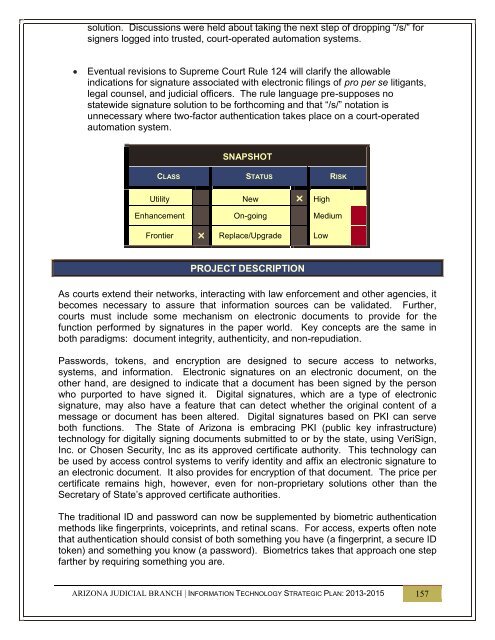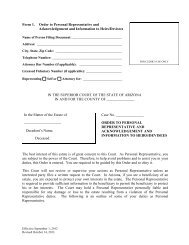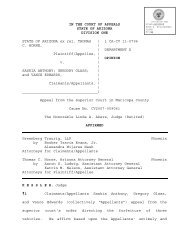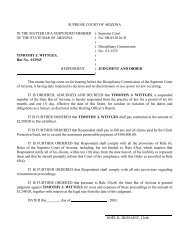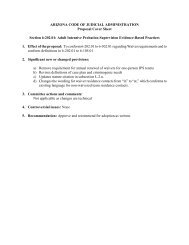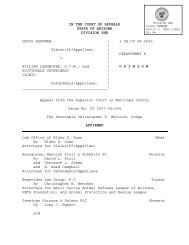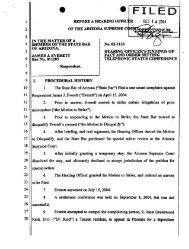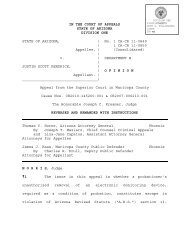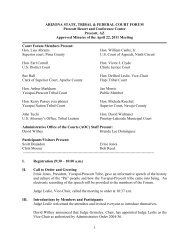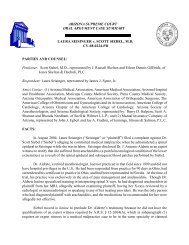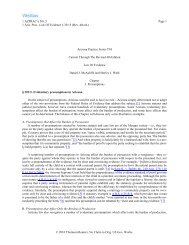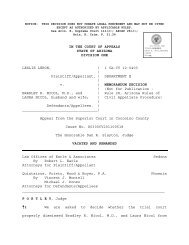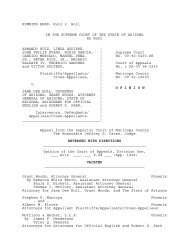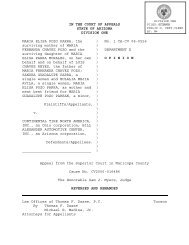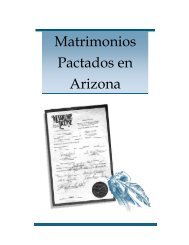Print Version - Arizona Judicial Department
Print Version - Arizona Judicial Department
Print Version - Arizona Judicial Department
You also want an ePaper? Increase the reach of your titles
YUMPU automatically turns print PDFs into web optimized ePapers that Google loves.
solution. Discussions were held about taking the next step of dropping “/s/” for<br />
signers logged into trusted, court-operated automation systems.<br />
Eventual revisions to Supreme Court Rule 124 will clarify the allowable<br />
indications for signature associated with electronic filings of pro per se litigants,<br />
legal counsel, and judicial officers. The rule language pre-supposes no<br />
statewide signature solution to be forthcoming and that “/s/” notation is<br />
unnecessary where two-factor authentication takes place on a court-operated<br />
automation system.<br />
SNAPSHOT<br />
CLASS STATUS RISK<br />
Utility New High<br />
Enhancement On-going Medium<br />
Frontier Replace/Upgrade Low<br />
PROJECT DESCRIPTION<br />
As courts extend their networks, interacting with law enforcement and other agencies, it<br />
becomes necessary to assure that information sources can be validated. Further,<br />
courts must include some mechanism on electronic documents to provide for the<br />
function performed by signatures in the paper world. Key concepts are the same in<br />
both paradigms: document integrity, authenticity, and non-repudiation.<br />
Passwords, tokens, and encryption are designed to secure access to networks,<br />
systems, and information. Electronic signatures on an electronic document, on the<br />
other hand, are designed to indicate that a document has been signed by the person<br />
who purported to have signed it. Digital signatures, which are a type of electronic<br />
signature, may also have a feature that can detect whether the original content of a<br />
message or document has been altered. Digital signatures based on PKI can serve<br />
both functions. The State of <strong>Arizona</strong> is embracing PKI (public key infrastructure)<br />
technology for digitally signing documents submitted to or by the state, using VeriSign,<br />
Inc. or Chosen Security, Inc as its approved certificate authority. This technology can<br />
be used by access control systems to verify identity and affix an electronic signature to<br />
an electronic document. It also provides for encryption of that document. The price per<br />
certificate remains high, however, even for non-proprietary solutions other than the<br />
Secretary of State’s approved certificate authorities.<br />
The traditional ID and password can now be supplemented by biometric authentication<br />
methods like fingerprints, voiceprints, and retinal scans. For access, experts often note<br />
that authentication should consist of both something you have (a fingerprint, a secure ID<br />
token) and something you know (a password). Biometrics takes that approach one step<br />
farther by requiring something you are.<br />
ARIZONA JUDICIAL BRANCH | INFORMATION TECHNOLOGY STRATEGIC PLAN: 2013-2015 157


